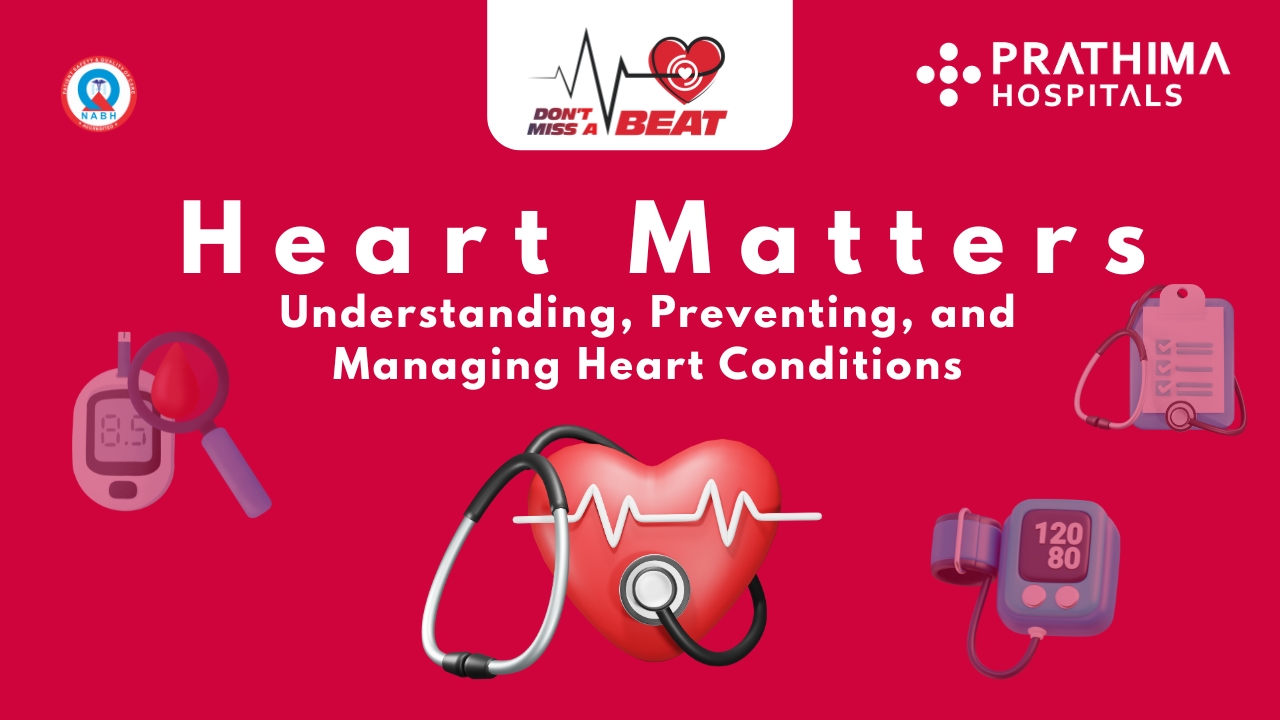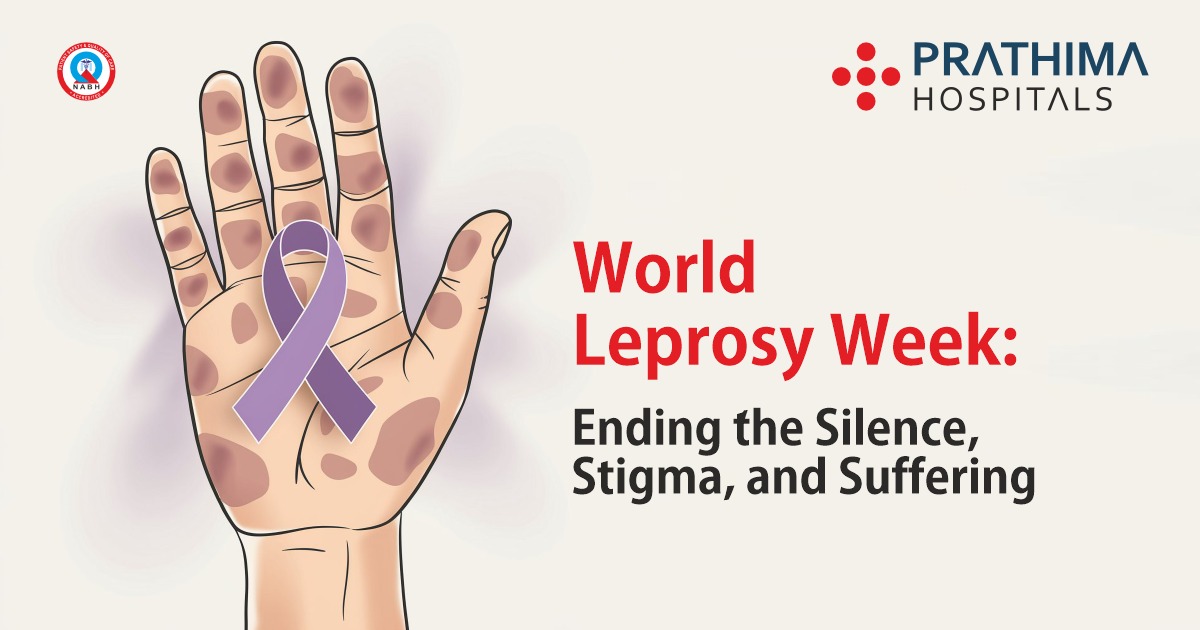Heart Matters: Understanding, Preventing, and Managing Heart Conditions

Understanding, Preventing, and Managing Heart Conditions
The heart, a marvel of the human body, works tirelessly to pump blood, oxygen, and nutrients to every part of our system. Yet, despite its crucial role, heart conditions remain one of the leading causes of death worldwide. In 2025, with rising stress levels, sedentary lifestyles, and unhealthy diets, understanding heart health has never been more important. This Ultimate Guide to Heart Health highlights the importance of awareness, prevention, and timely intervention to save lives, making heart care a priority for everyone.
At Prathima Hospitals – the Best Cardiology Hospital in Hyderabad, we are committed to helping patients adopt healthy lifestyles and access world-class cardiac care. Our expert team, as the Best Cardiologist in Kachiguda and the Best Cardiologist in Kukatpally, offers trusted care for all heart-related needs.
Understanding Heart Conditions
Heart conditions encompass a range of disorders that affect the heart’s structure or function. Some of the most common include:
- Coronary Artery Disease (CAD): CAD occurs when the arteries supplying blood to the heart become narrow or blocked due to plaque buildup, leading to reduced blood flow. Symptoms may include chest pain (angina), shortness of breath, and fatigue. Left untreated, it can lead to a heart attack.
- Heart Attack (Myocardial Infarction): A heart attack happens when blood flow to a part of the heart is blocked, usually by a blood clot. Early recognition is critical, as delayed treatment can damage heart muscles and be life-threatening.
- Heart Failure: Often called congestive heart failure, this condition occurs when the heart cannot pump blood effectively. Symptoms include fatigue, swelling in legs, and shortness of breath, often worsening with age or underlying conditions.
- Arrhythmias: These are irregular heartbeats caused by faulty electrical signals in the heart. They can range from harmless palpitations to dangerous rhythms like ventricular fibrillation, which require immediate medical attention.
- Valvular Heart Disease: The heart’s valves ensure blood flows in the correct direction. Damage or malfunction can lead to regurgitation or stenosis, disrupting circulation and causing fatigue, swelling, and shortness of breath.
Understanding these conditions is the first step toward prevention and effective management.
Causes and Risk Factors
Heart conditions rarely appear overnight; they develop gradually due to a combination of lifestyle, genetic, and environmental factors. Common risk factors include:
- High Blood Pressure (Hypertension): Persistently high blood pressure forces the heart to work harder, increasing the risk of heart failure, stroke, and coronary artery disease.
- High Cholesterol: Excess cholesterol leads to plaque buildup in arteries, narrowing them and increasing the risk of CAD.
- Diabetes: Elevated blood sugar levels can damage blood vessels and nerves controlling the heart, increasing heart disease risk.
- Obesity: Carrying excess weight strains the heart, often causing hypertension, diabetes, and increased cholesterol levels.
- Smoking: Tobacco smoke damages blood vessels, reduces oxygen in the blood, and increases the risk of clot formation.
- Sedentary Lifestyle: Lack of exercise reduces heart efficiency and contributes to obesity and high blood pressure.
- Stress and Poor Mental Health: Chronic stress raises blood pressure and stress hormones, which may contribute to heart disease over time.
- Family History: Genetic predisposition plays a role; if heart disease runs in the family, risk levels are higher.
Recognizing these risk factors allows individuals to make proactive lifestyle changes.
Symptoms to Watch For
Heart conditions can manifest subtly or suddenly. Common warning signs include:
- Chest pain or tightness
- Shortness of breath during rest or mild activity
- Unusual fatigue or weakness
- Swelling in the legs, ankles, or feet
- Rapid or irregular heartbeat
- Dizziness or fainting
Early detection saves lives. Regular checkups with Prathima Hospitals’ Best Cardiologist in Kukatpally can help identify and treat heart problems before they become severe. Monitoring blood pressure, cholesterol levels, and diabetes screening can detect issues before they become severe.
Ultimate Guide to Heart Health – Prevention: Lifestyle Choices That Matter
Prevention is always better than cure, especially when it comes to heart health. Evidence-based lifestyle interventions include: As the Ultimate Guide to Heart Health, we recommend:
- Balanced Diet: Focus on fruits, vegetables, whole grains, lean proteins, and healthy fats. Limit salt, sugar, and processed foods. Foods rich in omega-3 fatty acids, such as fish and flaxseeds, help reduce inflammation and maintain healthy cholesterol levels.
- Regular Exercise: Aim for at least 150 minutes of moderate-intensity aerobic activity per week. Walking, cycling, swimming, or even household activities can significantly strengthen the heart.
- Weight Management: Maintaining a healthy weight reduces strain on the heart and lowers the risk of hypertension, diabetes, and high cholesterol.
- Quit Smoking: Avoiding tobacco is one of the most effective ways to prevent heart disease. Even passive smoking can increase risk.
- Limit Alcohol Intake: Excessive alcohol can raise blood pressure and contribute to heart failure. Moderate consumption is key.
- Stress Management: Mindfulness, yoga, meditation, and hobbies can reduce stress hormone levels, benefiting overall cardiovascular health.
- Regular Health Screening: Routine checkups allow early detection of high blood pressure, cholesterol, and other risk factors, enabling timely interventions.
Treatment Options
When prevention isn’t enough, treatment options vary depending on the type and severity of the heart condition:
- Medications: Commonly prescribed drugs include beta-blockers, ACE inhibitors, diuretics, and statins. These help control blood pressure, reduce cholesterol, manage heart rhythm, and improve heart function.
- Lifestyle Interventions: Even after diagnosis, lifestyle changes remain crucial. Exercise, diet modification, and quitting smoking can enhance the effectiveness of medications.
- Surgical Procedures: For severe cases, procedures like angioplasty, stent placement, bypass surgery, or valve replacement may be required.
- Cardiac Rehabilitation: Structured programs combining exercise, education, and counseling can improve recovery and long-term heart health after a cardiac event.
Why Choose Prathima Hospitals
If you’re searching for expert cardiac care, look no further than Prathima Hospitals Cardiologist in Hyderabad. We offer:
- Advanced diagnostic facilities
- Experienced cardiology specialists
- Emergency heart care and 24/7 monitoring
- Patient-centered, holistic treatment plans
The Role of Awareness and Early Action
Heart disease often progresses silently. Many individuals may experience risk factors or minor symptoms without realizing the danger. Public awareness campaigns like World Heart Day emphasize recognizing early signs and seeking medical attention promptly. Educating communities about lifestyle modification, stress management, and the importance of regular checkups can drastically reduce heart disease mortality rates.
Moreover, technological advancements such as wearable heart monitors, telemedicine, and AI-based diagnostic tools are making it easier to track heart health and intervene before critical events occur. Combining technology with lifestyle changes creates a comprehensive approach to cardiovascular care.
Heart conditions affect not only patients but also families and communities. A sudden cardiac event can be devastating, leading to emotional and financial strain. Conversely, individuals who adopt heart-healthy habits often experience increased energy, productivity, and overall well-being. This underscores the holistic value of heart health; it’s not just about survival, but living a fulfilling life.
Every Beat Counts
Our hearts are extraordinary engines that rarely get a break, yet they are vulnerable to the choices we make daily. Understanding heart conditions, recognizing risk factors, and adopting preventive strategies can dramatically improve longevity and quality of life. From diet and exercise to timely screenings and stress management, every small step makes a difference. Prathima Hospitals, the Best Cardiology Hospital in Hyderabad, is your trusted partner in heart health – guiding you from prevention to recovery.
As we mark occasions like World Heart Day, remember this simple truth: don’t take your heart for granted; every beat counts. Prioritize your heart, listen to its signals, and empower yourself with knowledge and action. A healthy heart isn’t just about adding years to life, it’s about adding life to years.





